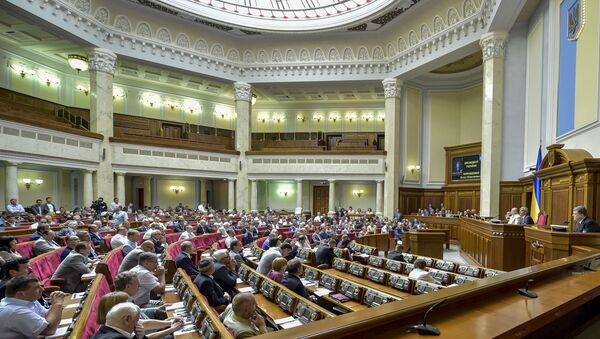"First of all, we need a change of government, a new government," Oleksandr Chalyi said.
According to the former official, the current government has been in power for 2 years but failed to carry out reforms.
"Plus this government has very little support of the population, approximately one percent. So if we want to realize our potential for reforms, we need a new government," Chalyi added.
After the government change, Kiev needs a clear economic recovery plan, which would include elements linked to financial stabilization and economic recovery "for real sector of Ukrainian economy," the diplomat said.
"I think we should focus on three or four sectors of the Ukrainian economy that will be in the future the locomotive of the Ukrainian economy, this is for example infrastructure, agriculture, and IT technology. We can find the investment for these sectors both outside and inside Ukraine," Chalyi stressed.
Ukraine 'lacks progress' on privatization
Moreover, Chalyi thinks that Ukraine is lacking progress on privatization of state assets due to resistance from oligarchs.
"The oligarchs [who] control a great part of the Ukrainian economy… resist, they want European norms, but they don't want to change the property rights. They also want to participate in the privatization of state enterprises and practically block it," Oleksandr Chalyi said.
According to Chalyi, the present Ukrainian government is not focused on eradicating corruption.
Ukraine's economic association with the EU depends on the Dutch referendum
Negative result of the Dutch April referendum on Ukraine's economic association with the European Union would seriously complicate finalization of the deal, Chalyi said.
"The Ukrainian government has to pay a very special attention to it. Because if the results of the referendum are negative for Ukraine, it will create lots of problems to finalize this agreement," Oleksandr Chalyi, who also served as the Ukrainian deputy foreign minister, said.
The Netherlands is the only EU country that has not yet ratified the Ukraine-EU association deal, which establishes a political and economic association between the parties. The government decided to hold a non-binding referendum after over 400,000 people signed a petition to put the matter to a nationwide vote.
Last week, Dutch Foreign Minister Bert Koenders acknowledged that if the people voted against the EU-Ukraine association agreement in the upcoming referendum, under Dutch law, the government would have to review its position on the treaty, although the vote itself is non-binding.
According to the latest opinion polls, over 55 percent of the Dutch electorate intend to vote against the measure and only 44.5 plan to vote for Ukraine’s proposed association with the 28-nation European Union.



